According to a suit filed by the US federal government, Century Ambulance and Liberty Ambulance allegedly collaborated with four area hospitals to transport Medicare and Medicaid patients lacking true medical need, in Jacksonville, Florida. The patients all ended up at one of four regional hospitals: Orange Park Medical Center, UF Health Jacksonville, Memorial Hospital and Baptist Medical Center Jacksonville, landing those institutions in hot water as well. The suit  strongly suggests the ambulance companies fraudulently claimed more than 15 million dollars for those misrepresented patients.
strongly suggests the ambulance companies fraudulently claimed more than 15 million dollars for those misrepresented patients.
The case sailed along to the settlement stage with help from key witness, EMT Shawn Pelletier. The witness testified about witnessing document falsification when billing US government controlled insurance programs. Pelletier will collect a portion of the lawsuit settlement payment for his participation as a whistleblower for this case.
Of course, the ambulance companies and hospitals all deny purposefully filing fraudulent claims in an effort to collect more money. In fact, the named institutions and companies decry the need for the lawsuit settlement cases at all. The operating managers blame a lack of adequate employee training in addition to the complexities of Medicare and Medicaid filing rules for the discrepancies. The companies intend to rectify the problem through increased training and alternative transportation options for stable patients.
Until the lawyers working for both sides finalize the written up settlement agreement, the case continues to sit in limbo for the time being. In the meantime, the government filed a second lawsuit against Liberty Ambulance for additional claims found during the discovery period of the trial. The settlements only seek to collect the money wrongfully taken from the government’s insurance accounts. Unless the lawyers can prove criminal wrongdoing by the responsible parties’, the case will not result in felony fraud charges for all of those involved.
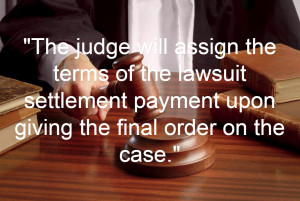 The companies’ deemed responsible for the fraudulent claims must repay the total listed amount by the given date or face further repercussions. The judge will assign the terms of the lawsuit settlement payment upon giving the final order on the case. For the foreseeable future, all further claims from these companies, and related claims from un-involved entities, will be under intense scrutiny by all US government insurance representatives.
The companies’ deemed responsible for the fraudulent claims must repay the total listed amount by the given date or face further repercussions. The judge will assign the terms of the lawsuit settlement payment upon giving the final order on the case. For the foreseeable future, all further claims from these companies, and related claims from un-involved entities, will be under intense scrutiny by all US government insurance representatives.


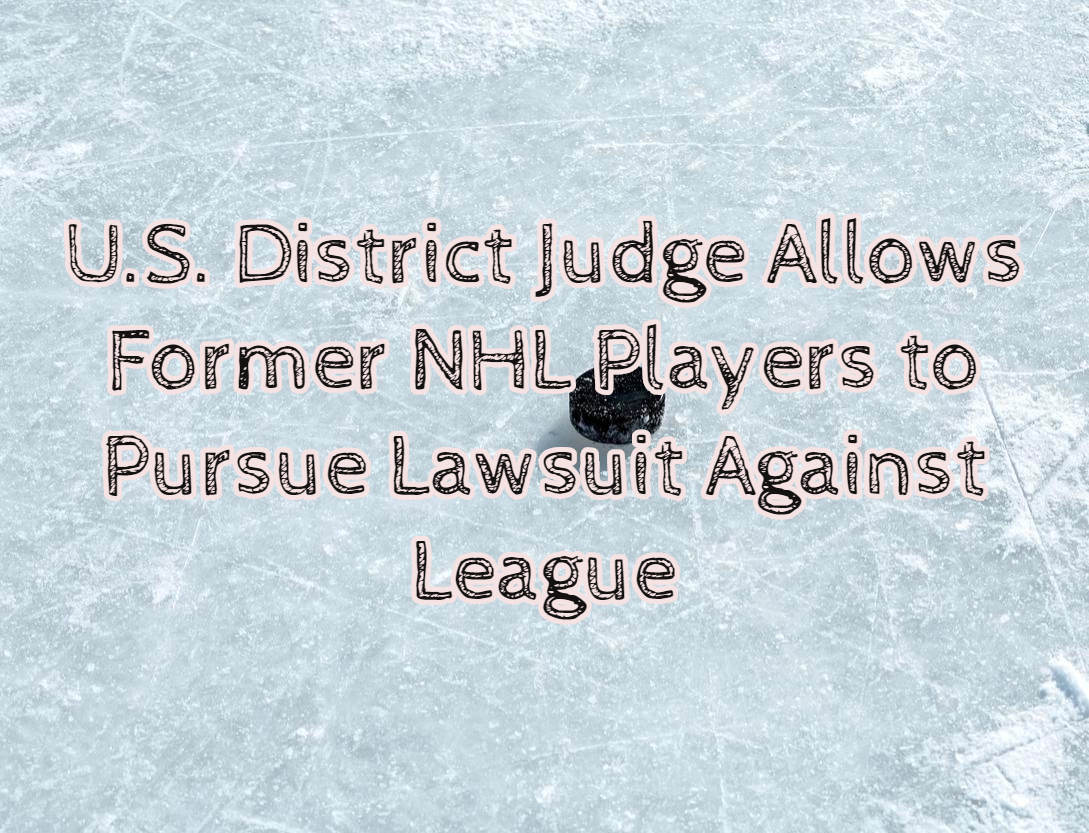
 initiatives related to football safety.
initiatives related to football safety.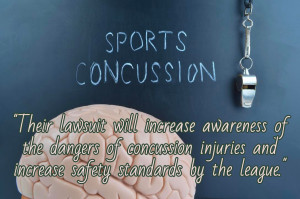 The plaintiffs are seeking unspecified financial damages and medical monitoring for the myriad of neurological disorders that are common among both former NHL and former NFL players, such as Parkinson’s and Alzheimer’s disease. Their lawsuit will increase awareness of the dangers of concussion injuries and increase safety standards by the league, regardless of the lawsuit settlement payment.
The plaintiffs are seeking unspecified financial damages and medical monitoring for the myriad of neurological disorders that are common among both former NHL and former NFL players, such as Parkinson’s and Alzheimer’s disease. Their lawsuit will increase awareness of the dangers of concussion injuries and increase safety standards by the league, regardless of the lawsuit settlement payment.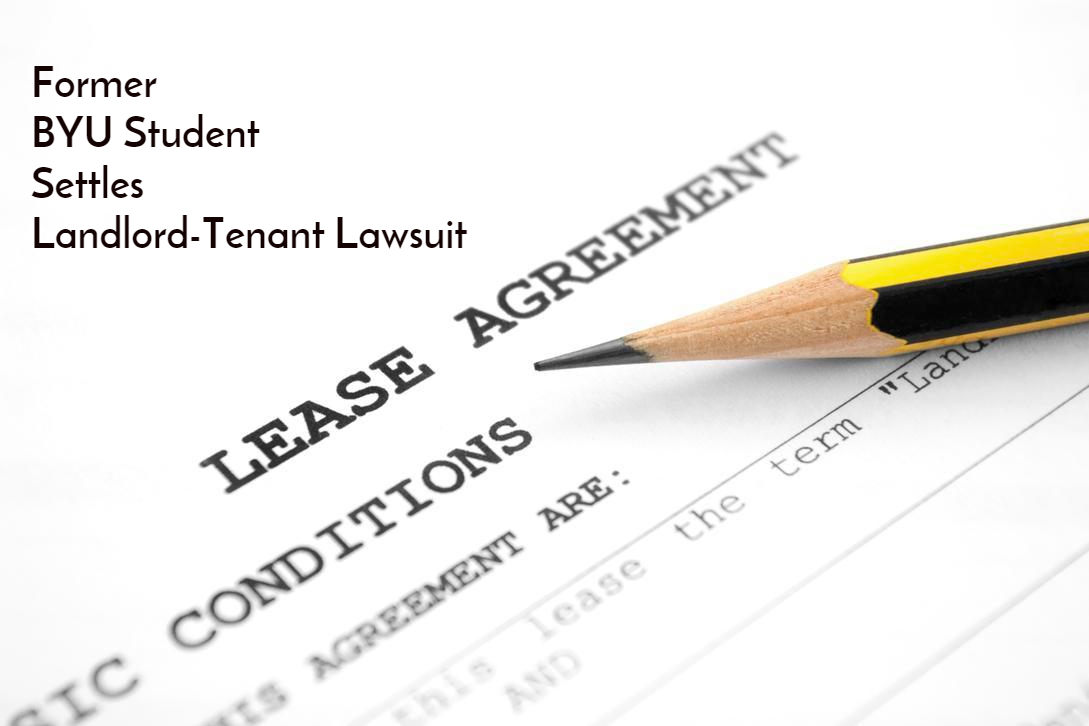
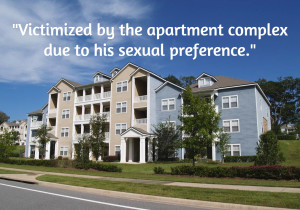 Andrew White, a former BYU student, has settled a highly publicized eviction lawsuit. White was evicted from his Provo apartment complex after his landlord claimed that he violated policies in his lease along with BYU’s code of honor and residential living standards. White, who is gay, allegedly had a dispute with his roommates over food which eventually led to them kicking him out of the house. His roommates allegedly turned against him after he admitted that he was gay and professed his adoration for one of his fellow apartment tenants.
Andrew White, a former BYU student, has settled a highly publicized eviction lawsuit. White was evicted from his Provo apartment complex after his landlord claimed that he violated policies in his lease along with BYU’s code of honor and residential living standards. White, who is gay, allegedly had a dispute with his roommates over food which eventually led to them kicking him out of the house. His roommates allegedly turned against him after he admitted that he was gay and professed his adoration for one of his fellow apartment tenants. Terms of the settlement were not disclosed. Yet White demanded damages in excess of $100,000, so it is believed that he emerged from the conflict with a sizable lawsuit settlement payment. White demanded such a large sum in order to pay for his relocation costs, damages, the repair and replacement of personal belongings and compensation for stress, fear and anxiety that he has endured since his eviction from the Village at South Campus.
Terms of the settlement were not disclosed. Yet White demanded damages in excess of $100,000, so it is believed that he emerged from the conflict with a sizable lawsuit settlement payment. White demanded such a large sum in order to pay for his relocation costs, damages, the repair and replacement of personal belongings and compensation for stress, fear and anxiety that he has endured since his eviction from the Village at South Campus.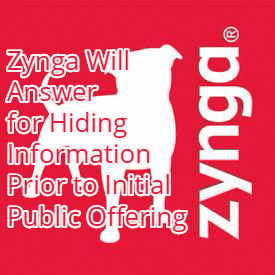
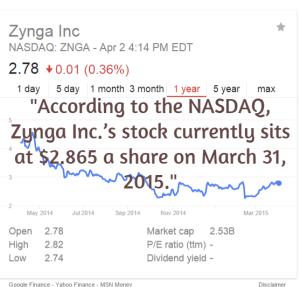 According to the NASDAQ, Zynga Inc.’s stock currently sits at $2.865 a share on March 31, 2015. However, the company’s previous history predictions of high ROIs fell short following the launch of Zynga’s IPO in December 2011, which ultimately led to the current legal situation involving fraud, concealment of business expectations, and inflation of its 2012 revenue forecast.
According to the NASDAQ, Zynga Inc.’s stock currently sits at $2.865 a share on March 31, 2015. However, the company’s previous history predictions of high ROIs fell short following the launch of Zynga’s IPO in December 2011, which ultimately led to the current legal situation involving fraud, concealment of business expectations, and inflation of its 2012 revenue forecast.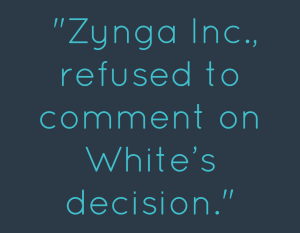 Since before the dismissal of allegations in February 2013, Zynga shares have remained steady below $5. Part of the problem lies in a failure of Zynga to introduce new games as competitors, such as King Digital Entertainment Plc, continue to make millions on games like “Candy Crush Saga and Bubble Witch.”
Since before the dismissal of allegations in February 2013, Zynga shares have remained steady below $5. Part of the problem lies in a failure of Zynga to introduce new games as competitors, such as King Digital Entertainment Plc, continue to make millions on games like “Candy Crush Saga and Bubble Witch.”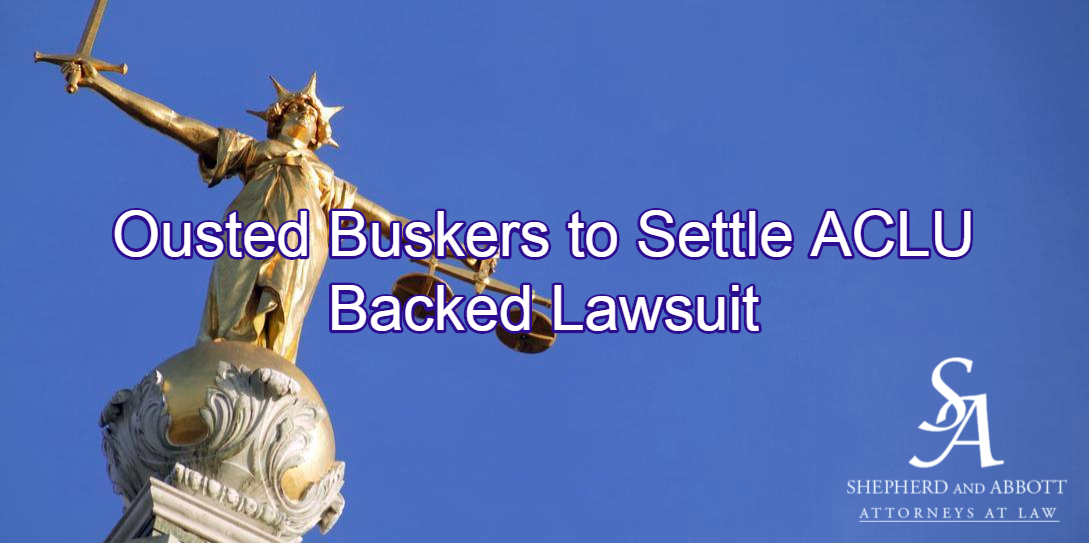
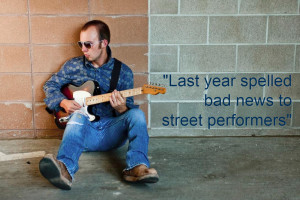 Last year spelled bad news to street performers, also known as buskers, in Saugatuck, Michigan. Street performers throughout Saugatuck had been told they must obtain permits before performing on sidewalks in an attempt to earn tips. Street performers fell under the Public Entertainment Ordinance, making it much more difficult for buskers to busk.
Last year spelled bad news to street performers, also known as buskers, in Saugatuck, Michigan. Street performers throughout Saugatuck had been told they must obtain permits before performing on sidewalks in an attempt to earn tips. Street performers fell under the Public Entertainment Ordinance, making it much more difficult for buskers to busk.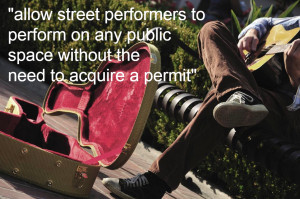 According to the ACLU, Saugatuck’s Public Entertainment Ordinance, required that businesses who wish to host an event acquire a permit 60 days prior to the event, hold related insurance and even provide toilets and parking to attendants. While a reasonable request of an event hosted by a business, this ordinance was also being applied to street performers. How could they possibly comply?
According to the ACLU, Saugatuck’s Public Entertainment Ordinance, required that businesses who wish to host an event acquire a permit 60 days prior to the event, hold related insurance and even provide toilets and parking to attendants. While a reasonable request of an event hosted by a business, this ordinance was also being applied to street performers. How could they possibly comply?